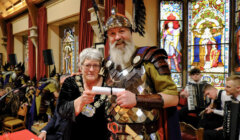Council / Councillor feels it is ‘ludicrous’ un-elected members are on committee
A SHETLAND councillor believes it is “ludicrous” that some non-elected members – such as religious representatives on the education and families committee – are still able to be involved in local democracy decision making.
Shetland Central member Ian Scott made the comments as councillors – they are obliged to do so by law – appointed a new religious representative to the education and families committee.
Andrew Miller was appointed as a Church of Scotland representative.
Under a Scottish law, from 1973, councils are required to appoint religious representatives to education committees.
Shetland Islands Council (SIC) constitution says these representatives should also have voting rights on education matters, but this is discretionary and could be reviewed.
And a possible review looks set to happen in 2025, when councillors will be able to debate the SIC’s wider governance arrangements.
Speaking at a meeting of the full council on Wednesday, Scott said: “I see no reason whatsoever that because of somebody’s personal beliefs, be it religion, or be it Yoda or whatever […] why on earth should these people have anything whatsoever with our education system?”
He added that councillors “stand and fall” by people voting for them in elections – and also referred to how there are debates ongoing at Westminster about hereditary, unelected peers in the House of Lords.
Scott also highlighted how a school closed in the Perth and Kinross Council area in 2019 following a tight vote.
The votes of appointed religious representatives influenced the decision, and the Perth and Kinross Council subsequently later removed their voting rights.
Other councils have also removed voting rights of religious representatives too, with Orkney for example doing so in 2023.
Speaking in 2022 former SIC education and families religious representative Martin Tregonning said these appointments could bring a different perspective to discussions in the chamber.
Become a member of Shetland News
He also felt there was a “mischaracterisation” around the role.
It came after a number of councillors expressed concern about the law requiring religious representatives be appointed to education and families committee.
Also in 2022 the chief executive of an organisation campaigning for the separation of church and state said the law “gives religion undue influence over the education of Scottish children”.
Stephen Evans, chief executive of the National Secular Society, backed Shetland councillors who said the law should be repealed.
Become a member of Shetland News
Shetland News is asking its many readers to consider paying for membership to get additional features and services: -
- Remove non-local ads;
- Bookmark posts to read later;
- Exclusive curated weekly newsletter;
- Hide membership messages;
- Comments open for discussion.
If you appreciate what we do and feel strongly about impartial local journalism, then please become a member of Shetland News by either making a single payment, or setting up a monthly, quarterly or yearly subscription.
















































































